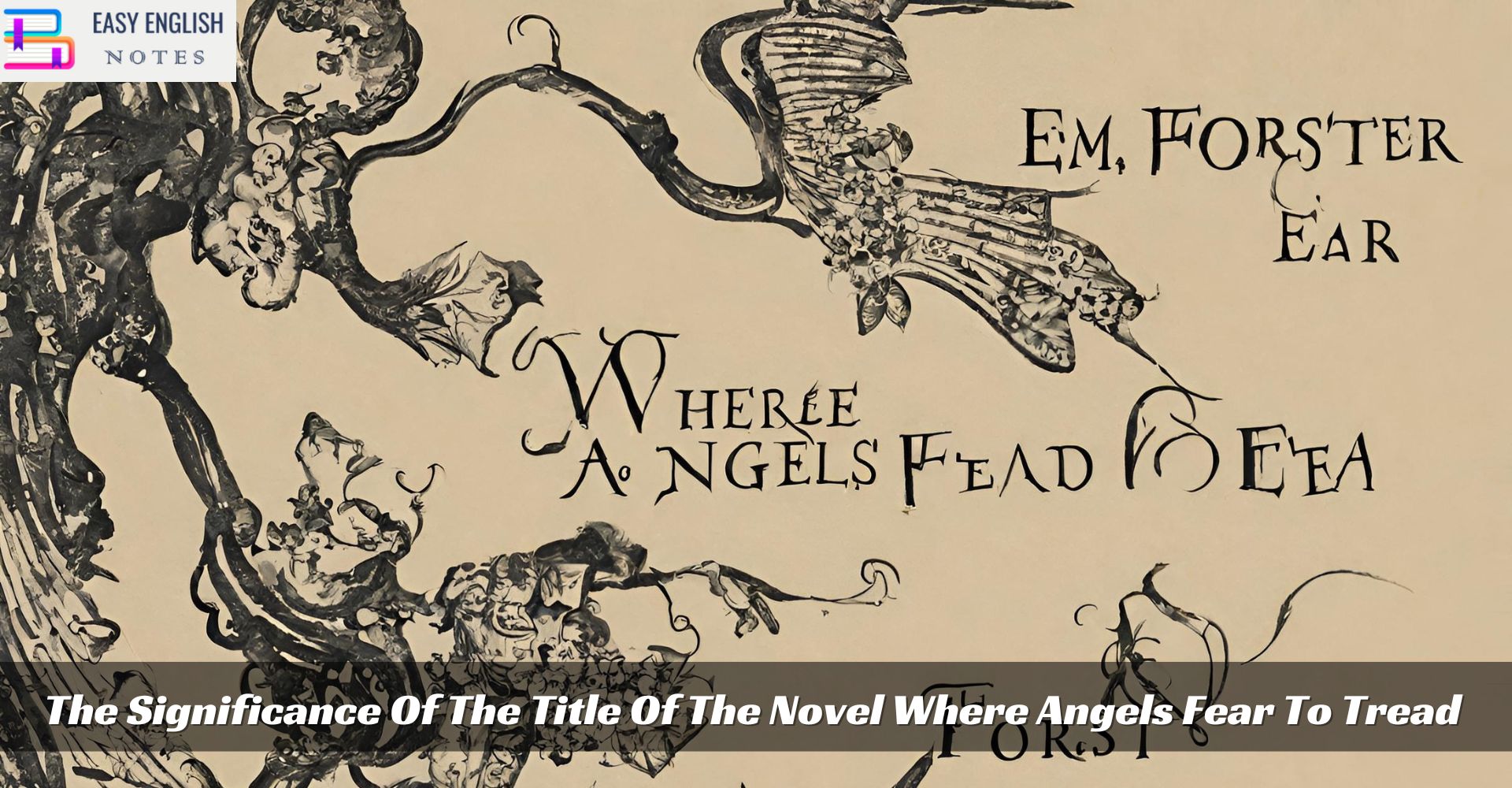‘Where Angels Fear to Tread is first novel of Forster. The title is based on Pope’s long poem ‘An Essay on Criticism. The full verse if *For Fools rush in where Angels Fear to Tread.” The sense is that fools try to do foolishly, what even angels cannot do. The title reflects the theme of the novel. Herritons and Caroline are fools rushing into Italy, to do something which it is difficult even for the angels to do. Even angles are not capable of bringing reconciliation between the two cultures. The reconciliation is partial. Herritons and Caroline may be fools, but their foolish attempts at reconciliation were necessary even for a partial reconciliation. This is how the title is closely related with the theme. The theme applies comic implication. ‘fools’ and ‘angels’ ‘rush’ and ‘tread’ have clear comic figure. The basic need of the novel is comic. The comic note is fully struck at very opening of the novel. When there is a gay crowd at the railway station to see Lilia and Caroline off to Italy. The novel is quite serious.
It is interesting to note that the original title throughout by Forster was ‘The Rescue and he drew up a simple timetable of the rescues in the manuscript which is now in the British Museum. While the world ‘rescue has a physically connotation, to the word ‘save’ has an element of spiritual salvation. It is in this context that ‘where Angles Fear to Tread’ fits better than the original title, “The Rescue.” John Colmer has a point when he say that a possible suitable to “Where Angels Fear to Tread” might be the education of Philip. His education consists in learning that life was more complex and heroic than he had thought, that it was not enough to see clearly and laugh and that it must never be regarded as spectacle. He can admire both approaches to life and they appear to give him deeper insight into reality. He can only contemplate their beauty, he cannot actively embrace them.
The title of the novel reflects ironically on the theme. There is clash between cultures and values. Forster is the novelist of cultures. Cultures are the main theme of the novelist. He was the sensitive critic of his time in England. He always brought out the deficiencies of his own culture by contrasting it with other more vital and vigorous cultures.
The English culture is devoted by Sawston, a suburb of London. It is full of narrow and Stupidity environment. All the characters are suffering from these vices. They are the fools who rush in to intervene in human affairs where even angels would hesitate. Forster expose their stupidity and hypocrisy through their foolish actions, like trying to break Lilla’s marriage with Gino or to stead the baby who dies so tragically. It is in the respect that the little of the novel is quite befitting.
Also Read :
- Compare Hamlet with Macbeth, Othello and other Tragedies
- “The Pardoner’s Tale” is the finest tale of Chaucer
- Prologue to Canterbury Tales – (Short Ques & Ans)
- Confessional Poetry – Definition & meaning
- Line By Line Explanation Of The Poem The Eve of St. Agnes
The title of E.M. Forster’s novel, “Where Angels Fear to Tread,” is deeply significant and serves as a thematic cornerstone for the entire narrative. It is derived from the phrase “Fools rush in where angels fear to tread,” originally from Alexander Pope’s poem “An Essay on Criticism.” This phrase and, by extension, the title of the novel, encompass several key themes and ideas explored in the story:
- Rashness vs. Caution: The title highlights the contrast between recklessness and discretion. It implies that the characters in the novel act impulsively, venturing into situations or relationships without the caution that even ‘angels’, or wiser beings, would exercise. This recklessness is a central driver of the plot and the conflicts that arise.
- Cultural Arrogance: The novel deals with English tourists interacting with Italian society, often in a condescending or naive manner. The title suggests the English characters’ presumption in believing they understand and can navigate a foreign culture, a presumption that leads to misadventures and misunderstandings.
- Misguided Ideals and Romanticism: Many characters in the novel are driven by idealism or romantic notions, leading them to make decisions without fully understanding the complexities of their situations. The title reflects the folly of acting on such naivety, as even more ‘angelic’ or knowledgeable individuals would approach these situations with caution.
- Tragic Consequences of Impulsiveness: The narrative shows how impulsive actions, driven by emotion or idealism, can lead to tragic outcomes. The title serves as a forewarning of these consequences, suggesting that even well-intentioned actions can be misguided and dangerous when undertaken without proper foresight.
- Moral and Ethical Ambiguity: The phrase “where angels fear to tread” suggests a venture into morally or ethically ambiguous territory. It points to the novel’s exploration of complex social and personal dilemmas where the ‘right’ course of action is not always clear, even to the most morally astute.
In essence, the title of “Where Angels Fear to Tread” encapsulates the novel’s exploration of the pitfalls of arrogance, impulsiveness, cultural misunderstanding, and the often tragic results of acting without proper understanding or respect for the nuances of different cultures and individual situations. It serves as a poignant reminder of the complexity and unpredictability of human interactions.











